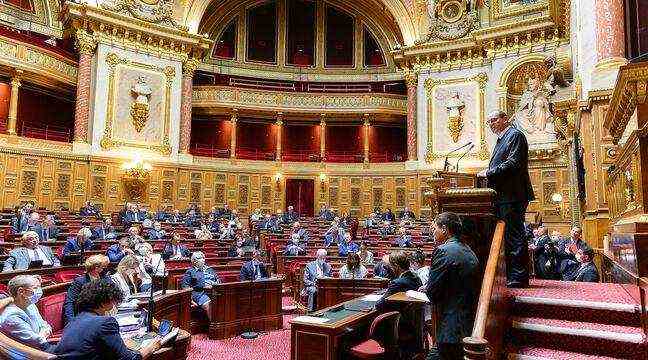The “inflation allowance” of 100 euros from the government, a flagship measure of the second budget bill rectified for 2021, was abolished on Wednesday by the Senate dominated by the right-wing opposition, to replace it with a “one-off” reinforcement of existing systems deemed “better targeted”.
The High Assembly adopted by 145 for, 30 votes against and 168 abstentions, on first reading, this amended finance bill (PLFR) known as “end of management” thus modified. The National Assembly will be able to restore the government’s text after the shuttle.
“Significant windfall effects attributable to its lack of targeting”
Announced by the Prime Minister in October, in reaction to the surge in fuel prices, “the inflation allowance” amounts to 100 euros and will be paid to 38 million French people, “employees, self-employed, retirees, unemployed, benefit recipients social minima, scholarship students, receiving less than 2,000 euros per month ”, according to the government. Its cost to public finances is estimated at 3.8 billion euros. “We have made a choice of method, it is simplicity and speed,” said Minister of Public Accounts Olivier Dussopt, also underlining the government’s attachment “to a large perimeter” of beneficiaries.
For the general rapporteur of the Senate Finance Committee Jean-François Husson (LR), this “electoral measure (…) combines the disadvantages”: in addition to its “very high” cost for the State, “massive threshold effects” and “significant windfall effects attributable to its lack of targeting”. Instead, the Senate voted by show of hands, with the sole votes of the Les Républicains group, an exceptional increase of 150 euros in the activity bonus, an exceptional allowance of 150 euros for beneficiaries of minimum social benefits and benefits social benefits, as well as an additional allocation for mobility aid paid on a case-by-case basis to the unemployed and young people on the path to integration.
A long-term purchasing power problem
Jean-François Husson praised a “better targeted” device, with a cost for the State reduced to 1.5 billion euros. The centrist group chose to abstain, Vincent Capo-Canellas saying his “skepticism” in the face of a device which “leaves a lot of holes in the racket”, self-employed workers and retirees in particular. Abstention also on the left. To mark, according to Rémi Féraud (PS), that the two devices, that of the government as that of the rapporteur, “are unsatisfactory but that we can still continue to seek better solutions together”.
“Everyone goes there for their Christmas present,” said Sophie Taillé-Polian for the environmental group. “This aid, which is only one-off, cannot suffice for a problem of purchasing power that is part of the long term,” she added. For Pascal Savoldelli (predominantly Communist CRCE), “it’s the distribution of crumbs”. The PLFR transcribes the new economic forecasts for the end of the crisis, with a public deficit reduced to 8.2% of GDP and a public debt of 115.3% of GDP at the end of 2021.

